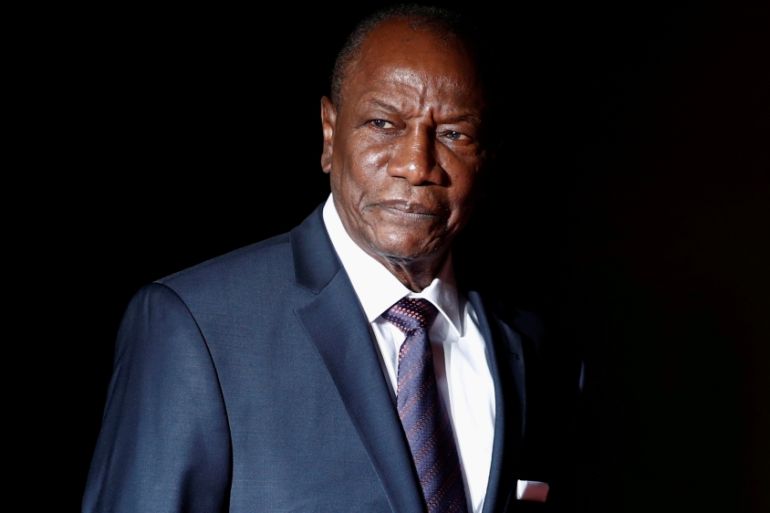Guinea President Conde hints at third term bid despite protests
Alpha Conde’s comments come days before controversial referendum on proposed new constitution.

Guinea‘s President Alpha Conde has suggested publicly for the first time that he could run for a third term if the constitution is changed, a move likely to fuel further unrest.
Guineans vote on Sunday in parliamentary elections and a referendum on constitutional reforms that could allow the 81-year-old to stand again, and the prospect of him staying longer in office has already led to months of sometimes violent protests.
Keep reading
list of 3 itemsGuinea opposition parties to boycott parliamentary poll
Protests in Guinea on President Alpha Conde’s bid to extend term
Opponents see the process as a plot to enable Conde, who approaches the end of the two terms allotted under the present constitution, to stay in power for up to another decade. For Conde, who became Guinea’s first democratically elected leader in 2010, the changes will create a “modern constitution”.
In an interview with Le Figaro newspaper that was published on Wednesday, Conde said the 2010 constitution was bad and needed modernising.
“The Guinean people will ask this question: Is it the first time that a president changes the constitution to do a third or fourth term? Why would it be impossible in Guinea to do three mandates?” he asked.
In some other African countries, leaders have used a constitution change as an excuse to reset their term limits.
“It’s only Guinea that is criticised. Some countries can change constitution four or five times without being criticised,” Conde said, using Chadian President Idriss Deby as an example.
Western and Chinese businesses are also keeping an eye on how events unfold.
The West African nation is rich with natural resources including the world’s largest bauxite reserves, as well as in iron, gold, diamonds and oil.
But investments have stalled due to political instability and a lack of infrastructure and most of its 13 million people live in poverty. According to the World Bank, per capita income in 2018 was just $830. Growth stood at around 10 percent in 2016-2017, falling to 5.8 percent in 2018.
Conde’s first election victory in 2010 raised hopes for democratic progress in the former French colony after two years of military rule and nearly a quarter of a century under authoritarian President Lansana Conte, who died in 2008.
But Conde’s critics have accused him of cracking down on dissent and violently repressing protests – charges he has denied. He asked his government last year to draft a new constitution that would permit him to run for office again.
Conde has been “so disappointing”, said opposition leader Cellou Dalein Diallo, a former prime minister. He has created “a banana republic – a dictatorship in all but name”, Diallo said.
An alliance of parties, unions and grassroots groups opposed to the referendum delivered a similarly brutal judgement. “He took himself for Mandela but decided to become Bokassa,” it said, referring to Jean-Bedel Bokassa, the former president of the Central African Republic who declared himself emperor.
The Paris-based group of French-speaking countries, the Organisation Internationale de la Francophone, which had been due to monitor Sunday’s vote, has suspended its support of the ballot.
It questioned the credibility of the vote due to 2.49 million “problematic” entries on the electoral register.
It also called on Guinean authorities “to act quickly to avoid any further loss of human life and to stop any risk of escalation towards violence”.
Conde said he was surprised by the organisation’s reaction and accused the opposition of calling for violence and hiring young people to throw stones.
“We will do everything to keep the calm and ensure the population can vote,” Conde said.